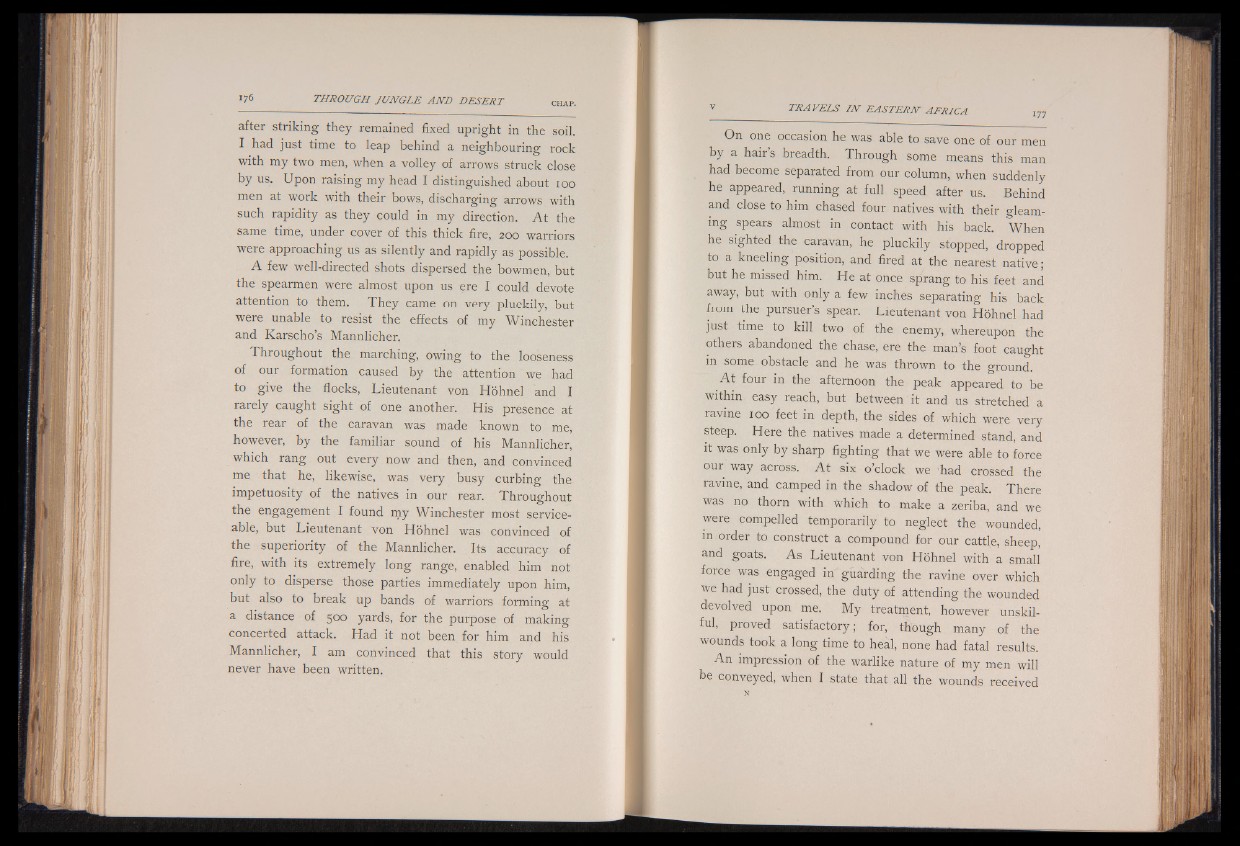
after striking they remained fixed upright in the soil.
I had just time to leap behind a neighbouring rock
with my two men, when a volley of arrows struck close
by us. Upon raising my head I distinguished about 100
men at work with their bows, discharging arrows with
such rapidity as they could in my direction. A t the
same time, under cover of this thick fire, 200 warriors
were approaching us as silently and rapidly as possible.
A few well-directed shots dispersed the bowmen, but
the spearmen were almost upon us ere I could devote
attention to them. They came on very pluckily, but
were unable to resist the effects of my Winchester
and Karscho’s Mannlicher.
Throughout the marching, owing to the looseness
of our formation caused by the attention we had
to give the flocks, Lieutenant von Hohnel and I
rarely caught sight of one another. His presence at
the rear of the caravan was made known to me,
however, by the familiar sound of his Mannlicher,
which rang out every now and then, and convinced
me that he, likewise, was very busy curbing the
impetuosity of the natives in our rear. Throughout
the engagement I found my Winchester most serviceable,
but Lieutenant von Hohnel was convinced of
the superiority of the Mannlicher. Its accuracy of
fire, with its extremely long range, enabled him not
only to disperse those parties immediately upon him,
but also to break up bands of warriors forming at
a distance of 500 yards, for the purpose of making
concerted attack. Had it not been for him and his
Mannlicher, I am convinced that this story would
never have been written.
On one occasion he was able to save one of our men
by a hair’s breadth. Through some means this man
had become separated from our column, when suddenly
he appeared, running at full speed after us. Behind
and close to him chased four natives with their gleaming
spears almost in contact with his back. When
he sighted the caravan, he pluckily stopped, dropped
to a kneeling position, and fired at the nearest native;
but he missed him. He at once sprang to his feet and
away, but with only a few inches separating his back
from the pursuer’s spear. Lieutenant von Hohnel had
just time to kill two of the enemy, whereupon the
others abandoned the chase, ere the man’s foot caught
in some obstacle and he was thrown to the ground.
A t four in the afternoon the peak appeared to be
within easy reach, but between it and us stretched a
ravine 100 feet in depth, the sides of which were very
steep. Here the natives made a determined stand, and
it was only by sharp fighting that we were able to force
our way across. A t six o’clock we ’had crossed the
ravine, and camped in the shadow of the peak. There
was no thorn with which to make a zeriba, and we
were compelled temporarily to neglect the wounded,
in order to construct a compound for our cattle, sheep,
and goats. As Lieutenant von Hohnel with a small
force was engaged in'gua>ding the ravine over which
we had just crossed, the duty of attending the wounded
devolved upon me. My treatment, however unskilful,
proved satisfactory; for, though many of the
wounds took a long time to heal, none had fatal results.
An impression of the warlike nature of my men will
be conveyed, when I state that all the wounds received